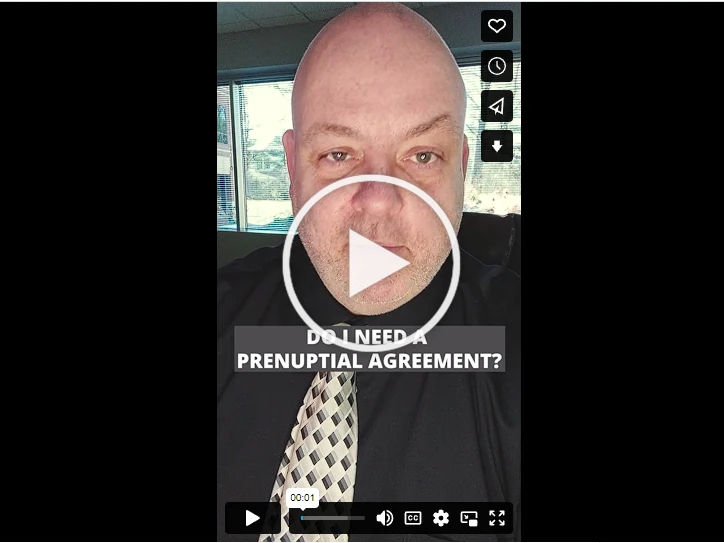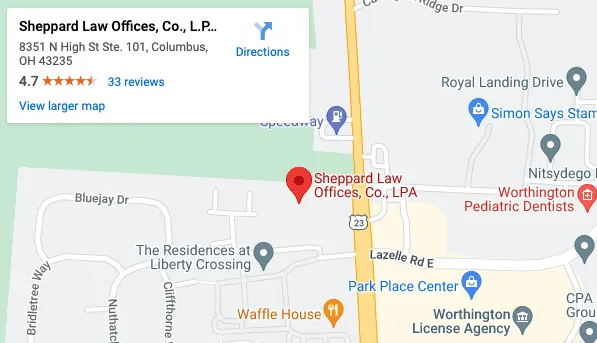 Protect your finances and other assets in case of a divorce
Protect your finances and other assets in case of a divorce
Are you considering marriage and wondering, “Do I need a prenuptial agreement in Columbus, OH?” Sheppard Law Offices can help you. Our family law attorneys can provide the best advice and protection for your future. We understand that this is a difficult decision to make, and we are here to help you make an informed decision.
We offer a free initial consultation to discuss your needs and answer any questions. Our attorneys will work with you to ensure your best interests are protected. Call us now to schedule your free initial consultation and learn more about prenuptial agreements in Columbus, OH.
What is a Prenuptial Agreement?
A prenuptial agreement, also called a premarital agreement, is a contract between two people about to be married. It is designed to protect the rights and interests of both parties in the event of a divorce, dissolution of the marriage, or death.
The following are common elements included in a prenuptial agreement:
- Stipulations: A prenuptial agreement outlines the rights and responsibilities of each party in case of a divorce, dissolution of the marriage, or death. It can include stipulations regarding property division, debt protection, alimony, and inheritance rights.
- Purpose: The purpose of a prenuptial agreement is to protect the rights and interests of both parties in the event of a divorce or dissolution of the marriage.
- Property Division: In a prenuptial agreement, property division is a clause that specifies how the couple’s assets will be divided in the event of a divorce. This provision usually contains a list of each party’s assets and how they will be divided in case of a divorce.
- Debt Protection: Debt protection in a prenuptial agreement is a clause that states that each spouse will remain responsible for any debts they had before the marriage. This means that if one spouse has a large amount of debt before marriage, the other spouse will not be held responsible for it in case of a divorce. This clause can also be used to protect assets from being used to pay off debts incurred by one spouse during the marriage.
- Children from a Previous Marriage: A prenuptial agreement is also a good idea for couples marrying for the second or third time. This is because you may have children from a previous marriage whom you want to guarantee to receive certain items rather than your new spouse in the event of your divorce or death.
- Child Custody and Child Support: Prenuptial agreements cannot resolve child custody or child support issues. On the other hand, parents in Ohio can include some principal childcare roles and responsibilities in the prenuptial agreement. This might involve one spouse paying for the family house until the children reach the age of 18. A prenuptial agreement, however, cannot specify child support amounts or custody and visitation arrangements. When these issues are pending, a family court determines the case. They always consider the children’s best interests.
- Alimony: In Ohio, alimony is deliberated in a prenuptial agreement, just like in any other state. The parties must agree on the amount of alimony, the duration of alimony payments, and any other terms related to alimony. The agreement must:
- be in writing, signed by both parties in front of two witnesses before the wedding;
- not encourage divorce;
- have both parties fully disclose their finances, debts, property, and other assets;
- and not have any party enter the agreement under duress, fraud, or coercion.
- Rights of Inheritance: Protecting inherited assets during a divorce from being divided and given to your spouse may be a considerable concern. You might not want your spouse to get any of the money or property you inherit from your family. Fortunately, an attorney can help you plan ahead of time to protect your inheritance. If you or your spouse decide to divorce, a lawyer can help you protect your inheritance.
- Death: Death is not typically discussed in a prenuptial agreement in Ohio. However, if the parties wish to include provisions related to death, they may do so. Generally, these provisions would address how the parties’ assets will be divided in the event of one party’s death. The agreement may also include provisions related to life insurance policies, beneficiary designations, and other matters related to death.
Who Needs a Prenuptial Agreement in Ohio?
Those who are wealthy, have been divorced before, or are getting married at a later age may be more inclined to explore a prenuptial agreement. Instead of entrusting everything to the state’s laws in case of a divorce, this type of agreement can provide certainty. Those who own businesses or children from a prior relationship can also use it to safeguard their future.
Prenuptial agreements, which enable married couples to retain their properties separately and retain control over their financial future amid rising divorce rates, are becoming increasingly popular.
Is it Possible to Revoke a Prenuptial Agreement?
It can happen, but it is not easy. To get out of the agreement, one person would have to show that they were not of sound mind when they signed the prenuptial agreement or that they signed it because they were coerced or threatened. In addition, the agreement would be invalid if it was based on deception. The terms of the deal may be invalid if they were not properly written or filed.
What is a Cohabitation Agreement?
A cohabitation agreement in Ohio is a legally binding contract between two unmarried individuals living together. The agreement outlines the rights and responsibilities of each party in terms of financial obligations, division of property, and other matters related to their relationship.
It is important to note that cohabitation agreements are not recognized as marriage contracts in Ohio and do not provide the same legal protections as a marriage.
How Long Does a Prenuptial Agreement Last in Ohio?
A prenuptial agreement is usually binding for the entirety of the marriage. Some clauses may expire after a defined length of time. For example, premarital assets may be open to division after a decade of marriage. Furthermore, some clauses may become effective after a certain period, such as committing to pay alimony after five years of marriage.
Can a Prenuptial Agreement Protect Future Assets?
Yes. Prenuptial agreements are commonly used to protect future assets. Assets obtained before the couple married are considered separate assets and are typically excluded from division in case of a divorce or separation. On the other hand, funds obtained after the marriage are usually considered marital assets. A spouse can use a prenuptial agreement to safeguard their shares of marital assets, such as future income, real estate, property, and other assets.
What are the Laws Regarding Postnuptial Agreements in Ohio?
A new state law that goes into force in 2023 will enable spouses in Ohio to obtain postnuptial agreements. Postnups, like prenups, authorize couples to create a document outlining their separate and marital assets and how they will be divided if they divorce. The difference is that postnuptial agreements are entered into after marriage. Postnuptial agreements, like prenuptial agreements, can involve child support or custody provisions. When a couple divorces, they must handle these issues in separate agreements.
Let Us Help You With Prenuptial Agreements
Are you looking for detailed answers concerning drafting a prenuptial agreement? Sheppard Law Offices offers free initial consultations to let you know the answer to your question: “Do I need a prenuptial agreement in Columbus, OH?”
Protect your interests and assets with the help of our family law attorneys, serving clients in Columbus, Mount Vernon, and Newark. Contact us today to book an appointment and learn more about our other practice areas, which include divorce and family law, bankruptcy, tax, estate planning and probate, and wills and trusts.



